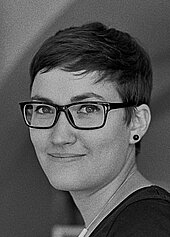Strohschneider, Anna-Katharina
Congratulations on passing the viva voce examination
on 15 July 2019.
Dissertation topic:
"Averroes and the Latin Commentators on the Conception of Metaphysics as a Science."
Doctoral fellowship from the Studienstiftung des deutschen Volkes (2013-2015) and research fellowship under the Bayerisches Eliteförderungsgesetz (2013).
Contact address at the University of Würzburg:
Institute of Philosophy
Residenz - Südflügel
97070 Würzburg
First supervisor: Prof. Dr Dag-Nikolaus Hasse
Second supervisors:
Prof. Dr Peter Adamson (LMU Munich)
Class in the Graduate School: "Middle Ages and Early Modern Age"
Doctorate in the Graduate School from WS 2012/2013.
Abstract:
My thesis explores Averroes' theory of the subject-matter of metaphysics and its reception in the Latin west.
In his Long Commentary on the Metaphysics, probably written between 1192 and 1194, the Arabic philosopher Averroes (Ibn Rušd, d. 1198) deals with Aristotle's Metaphysics extensively and in depth. I ask which position Averroes defends, and which interpretation he favours when it comes to the controversial topic of the subject-matter of metaphysics. My thesis shows that the traditional view of Averroes as the defender of a purely theological version of metaphysics misses the mark. Averroes presents a nuanced and complex theory regarding the respective responsibilities of physics and metaphysics and the proper place of a proof of God's existence.
I take into consideration the text in the original Arabic, as well as Averroes' sources and points of reference, such as Avicenna's Ilāhiyāt of the Šifāʾ, and I compare the Long Commentary on the Metaphysics to other relevant works by Averroes.
Since Michael Scot's translation of Aristotle's Metaphysics, alongside Averroes' Long Commentary, into Latin in the years 1220-1224, Averroes' reading of Aristotle, his prioritisation, his arguments and additions, had a huge impact on the understanding of Aristotelian philosophy in the Western world for centuries to come. While dealing with Aristotle's Metaphysics and as a direct reaction to Averroes' commentary, countless commentaries on the Metaphysics were composed in the Latin world, starting with the 13th century into the early modern times.
In order to be able to analyse the reception of Averroes, I examine if and how Averroes' position and arguments were adopted or dismissed in the commentaries of authors such as Thomas Aquinas, John Duns Scotus, Antonius Andreae, John of Jandun, and Agostino Nifo.






